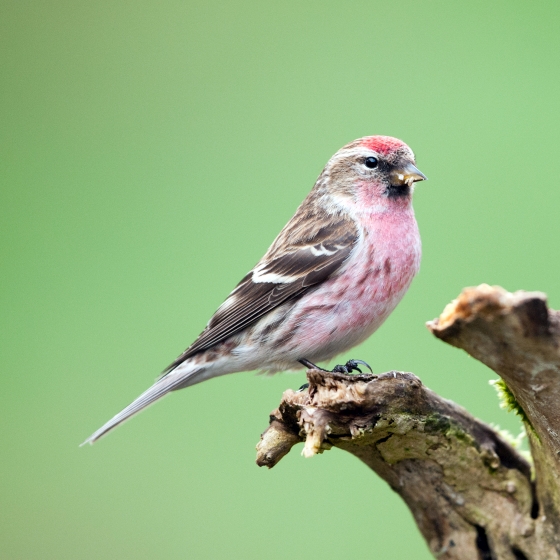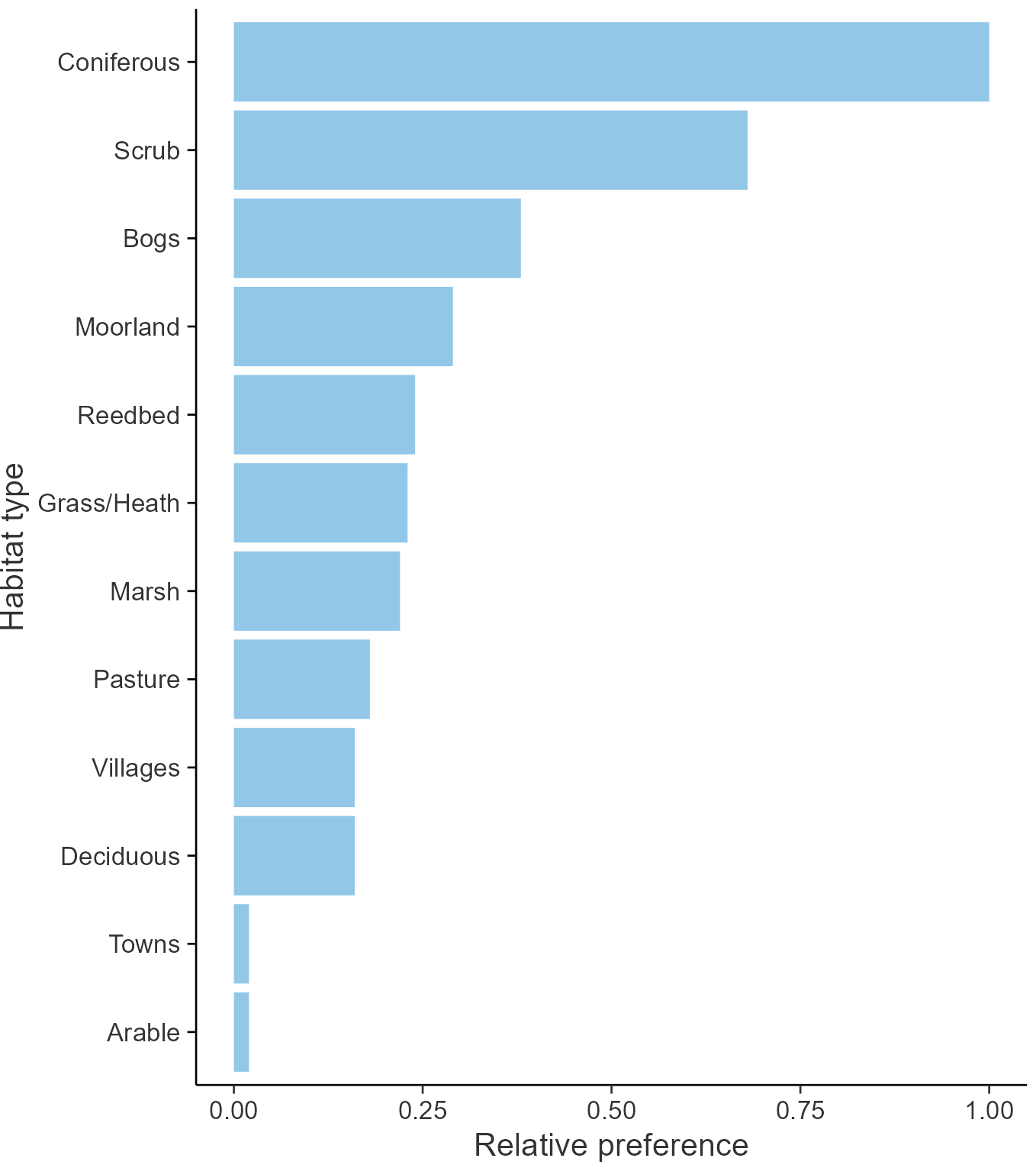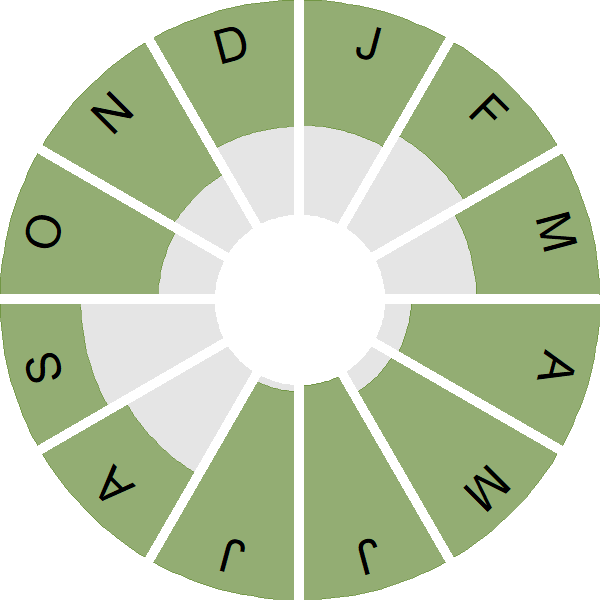Redpoll

Introduction
This small brown finch, with its red poll, belongs to a taxonomically complex group formerly consisting of three or more redpoll species. Following a recent taxonomic review it has been concluded there is a single Redpoll species with a circumpolar distribution.
A bird of moorland edge and garden, the Redpoll is the smallest and darkest of UK finch species. Bird seed put out in gardens has been shown to attract seed-eating Redpolls in the winter months. The Redpoll is on the UK Red List, having undergone a sharp population decline in the late 20th century.
During years when its favoured birch, Alder and larch seed crops fail, British Redpolls will move in large numbers, even leaving the UK in search of trees in which the seeds have flourished, whilst in good crop years they will only move short distances.
- Our Trends Explorer gives you the latest insight into how this species' population is changing.

Key Stats
Identification
Songs and Calls
Song:
Call:
Flight call:
Status and Trends
Conservation Status
Population Change
Lesser Redpolls were abundant and widespread in lowland Britain in the 1970s, and frequent then on CBC and CES plots, but, concurrent with a sustained period of severe decline, have withdrawn completely as breeding birds from large areas of lowland England (Balmer et al. 2013). Uncertainty about the representativeness of the monitoring data prior to the establishment of BBS initially denied the species a place among birds of conservation concern, since it was thought possible that the population may have withdrawn from the lowlands to northern and western UK regions, where monitoring prior to 1994 was less effective. Since a range contraction of 11% between 1968-72 and 1988-91 was evident in all parts of the UK (Gibbons et al. 1993), however, it is perhaps more likely that decrease was general. Accordingly the species was moved from green to amber in 2002 and in 2009 to the red list. Since Acanthis cabaret is currently treated by BOU as a separate species from the Common Redpoll A. flammea, and has a restricted range that lies wholly within western Europe, it arguably warrants a European conservation listing at the next review. The taxonomic status of cabaret remains controversial, however (Stoddart 2013). Recent UK data show a shallow increase since 1995, with a moderate increase having occurred in Scotland during that period; however, especially in lowland areas, the population remains very severely depleted. A rapid increase has been recorded in the Republic of Ireland since 1998 (Crowe 2012). The European trend for cabaret and flammea together is of decline since 1980 (PECBMS: PECBMS 2020a>).
Distribution
Lesser Redpoll breeds widely throughout Ireland, Wales, most of Scotland and northern England, and more patchily further south. In winter they are largely absent from sparsely wooded areas, intensively farmed lowlands and some uplands. Densities are high throughout Ireland, in wooded valleys and lowlands in northern and eastern Scotland, northern England and Wales, and in parts of southern and southeast England.
Occupied 10-km squares in UK
2007/08–10/11
or view it on Bird Atlas Mapstore.
2008–11
or view it on Bird Atlas Mapstore.
European Distribution Map
Distribution Change
Breeding range of the Lesser Redpoll contracted by 16% between 1968–72and 2008–11
Change in occupied 10-km squares in the UK
from 1981–84 to 2007–11
or view it on Bird Atlas Mapstore.
from 1968–72 to 2008–11
or view it on Bird Atlas Mapstore.
Seasonality
Lesser Redpoll is the UK's resident breeding redpoll and can be recorded throughout the year.
Weekly pattern of occurrence
The graph shows when the species is present in the UK, with taller bars indicating a higher likelihood of encountering the species in appropriate regions and habitats.

Habitats
Breeding season habitats
Relative frequency by habitat
The graph shows the habitats occupied in the breeding season, with the most utilised habitats shown at the top. Bars of similar size indicate the species is equally likely to be recorded in those habitats.

Movement
Britain & Ireland movement
Foreign locations of birds ringed or recovered in Britain & Ireland
Dots show the foreign destinations of birds ringed in Britain & Ireland, and the origins of birds ringed overseas that were subsequently recaptured, resighted or found dead in Britain & Ireland. Dot colours indicate the time of year that the species was present at the location.
- Winter (Nov-Feb)
- Spring (Mar-Apr)
- Summer (May-Jul)
- Autumn (Aug-Oct)

European movements
EuroBirdPortal uses birdwatcher's records, such as those logged in BirdTrack to map the flows of birds as they arrive and depart Europe. See maps for this species here.
The Eurasian-African Migration Atlas shows movements of individual birds ringed or recovered in Europe. See maps for this species here.
Biology
Productivity and Nesting
Nesting timing
Egg measurements
Clutch Size
Incubation
Fledging
Survival and Longevity
Survival is shown as the proportion of birds surviving from one year to the next and is derived from bird ringing data. It can also be used to estimate how long birds typically live.
View number ringed each year in the Online Ringing Report.
Lifespan
Survival of adults
Survival of juveniles
Biometrics
Wing length and body weights are from live birds (source).
Wing length
Body weight
Ring Size
Classification, names and codes
Classification and Codes
- Order: Passeriformes
- Family: Fringillidae
- Scientific name: Acanthis flammea
- Authority: Statius Müller, 1776
- BTO 2-letter code: RD
- BTO 5-letter code: REDPO
- Euring code number: 16635
Alternate species names
- Catalan: passerell alpí
- Czech: cecetka tmavá
- Danish: Lille Gråsisken
- Dutch: Kleine Barmsijs
- Estonian: lõuna-urvalind
- French: Sizerin cabaret
- Gaelic: Dearcan-seilich
- German: Alpenbirkenzeisig
- Hungarian: barna zsezse
- Irish: Deargéadan
- Italian: Organetto minore
- Latvian: mazais kegis
- Lithuanian: mažasis alksninukas
- Norwegian: Brunsisik
- Polish: czeczotka brazowa
- Portuguese: pintarroxo-pequeno
- Slovak: stehlík hnedkavý
- Spanish: Pardillo Alpino
- Welsh: Llinos Bengoch Fechan
Research
Causes of Change and Solutions
Causes of change
Although sample sizes are small, declines in both survival and productivity appear to have led to the Lesser Redpoll decline. Evidence for the ecological drivers behind this is largely circumstantial but they are thought to include maturation of woodland and a reduction in birch seed food supplies.
Further information on causes of change
Though samples are too small to continue presenting a trend, CES data indicated a rapid long-term decline in productivity and there is evidence that survival rates have fallen (Siriwardena et al. 1998).
There is very little evidence available regarding the ecological drivers behind the decline of this species. In southern Britain, at least, the decrease may be attributable to a reduction in the amount of suitable young forest growth (Fuller et al. 2005, Burgess et al. 2015a), although this is unlikely to have been the main driver (Burgess et al. 2015a). Amar et al. (2006) and Smart et al. (2007) both found relationships with lichen and bracken cover, although these studies were limited to broadleaved woodlands. Evans (1966) and Cramp & Perrins (1994) point to the importance of birch to the species, which could potentially explain the relationships found by Amar et al. (2006) and Smart et al. (2007). Birch seeds are an important component of this species' diet. Amar et al. (2006) state that birch has declined in many woodlands as they have matured, and this could raise the possibility of winter food as a factor in the species decline, although this evidence is circumstantial and given that species with similar winter diet, such as Siskin, are faring better, may be unlikely.
Information about conservation actions
The circumstantial evidence discussed in the Causes of Change section (above) suggests that maturation of woodland may have contributed to the decline of this species, in particular birch (Amar et al. 2006; Smart et al. 2007); hence planting birch may benefit this species by providing food during winter. Garden feeders may also help the species, particularly if winter survival is a driver of the decline. However, further research is needed to confirm the drivers of change for the species and to identify potential conservation actions.
More Evidence
More evidence from Conservation Evidence.com
Partners
Citing BirdFacts
If you wish to cite particular content in this page (e.g. a specific value) it is best to use the original sources as linked in the page. For a more general citation of the whole page please use: BTO (20XX) BirdFacts Species: profiles of birds occurring in the United Kingdom. BTO, Thetford (www.bto.org/birdfacts, accessed on xx/xx/xxxx).

